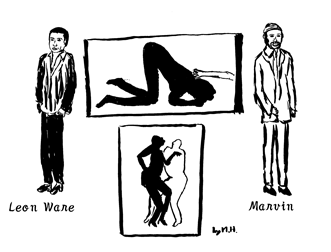

One day my radio played I Want You and After The Dance(vocal), and it was the first time when I knew Marvin Gaye's "I Want You". The DJ said "the medley of the intro jam of I Want You and After The Dance is so cool". I heard it and thought "What is he talking about?", however, I found these tunes themselves pretty fine and lost no time in buying the album. Grooves flowing all through the album are organic and like warm sheets, and Marvin's sexy delivery and lyrics make right fit with them. In those days I felt the easy but monotonous groove of disco was obsolete and it used to be that density of the tunes confined me to such an idea.
I have recently recognized the name of the actual main person of this album, Leon Ware, and I got his "Musical Massage", with a sensual sleeve, because I heard it contained the sound of I Want You. The introduction of the U.S.-released liner notes is probably the original one, which is written in such an exaggerated way as you become pregnant the moment Leon touches you. The following notes are about the inside story of these two albums told by Leon himself and I found them pretty interesting. It is said that "I Want You", which should have been Leon Ware's vocal album, was done for Marvin Gaye because of one word from the Motown president Berry Gordy as usual and that Leon managed to release "Musical Massage" in his own vocal, including tunes left out of "I Want You", but couldn't take Motown's cooperative promotion. If a viewpoint is limited to commercialism, I can only say that the president's decision was correct. Marvin's voice is not only a kind of 'everyone-knows' but soulful and wonderful in reality. I cannot deny that Leon's unique falsetto is more 'naive' than Marvin's. In a viewpoint of sentiment, the composer should not have been reasoned since he feels even the commercial songs are parts of his personality.
Leon Ware started his career as a backstage tunesmith of Motown since '60s. I found some CDs including songs Leon joined in. Got to Have You Back on "The Isley Brothers Story vol.1" is composed rather elaborately. While Leon released his first album, "Leon Ware[United Artists]" at a corporate label United Artists, he gave Come L'amore to his label-mate Bobby Womack in "Communication". These albums were under the influence of the contemporary introspective singer-songwriters and had a tinge of folk music or rock. I Wanna Be Where You Are, on Jackson 5's "The Ultimate Collection", is more complicated in composition than their other noted tunes and contains young Michael Jackson's hot and impressive performance. This tune is covered on "I Want You" but Marvin only sings the title part. You can hear Leon Ware also reads lyrics on a bonus track of "Musical Massage". Such contrast between Marvin's wit and Leon's sincerity is interesting. Rolling Down a Mountainside on the Isaac Hayes' rare compilation "Wonderful" is a tune of the age. Accompanied with its cool arrangement and rhythm given by Hayes, its dramatic development is supreme. On Quincy Jones' "Body Heat", Leon sings If I Ever Lose This Heaven with Minnie Riperton, fine soprano, and Al Jarreau, a jazz-fusionist. Leon also had duets with Minnie. His tendency toward music is against my favorite soul of '60s or '70s. It's true that such technical and sophisticated and comfortable skills he loves should be a help to 'digestion' for the whites or Orientals, but I finally feel dissatisfied with it.
Because of the popularity of 'I Want You' and the sympathy with Leon Ware, the Japanese are vigorous in reprinting his album. I listen to Japan-released "Inside Is Love" or "Leon Ware[Elektra]" . Especially the latter may be irresistible to lovers of mellow 'Blacon', which is a generic term of Adult Oriented Rock or Adult Contemporary Music of blacks. That kind of sophistication doesn't fit me. The dense grooves of "I Want You" and "Musical Massage" are 'flavors' even Leon Ware himself cannot reconstruct and he could have only at that time. Although his other albums aren't so bad, they are likely to hide themselves in each 'flavor' of the age. Despite it, it's our pleasure that a hidden story and album can reveal themselves after strict observation of Motown's president came loose. (2005/01/31)(2006/08/29)